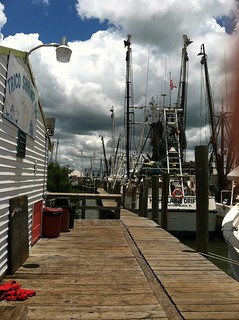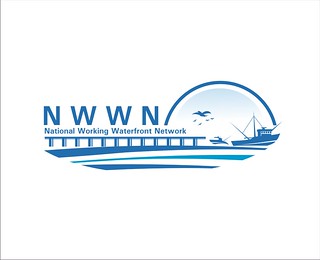
The importance of working waterfronts is reflected in U.S. ocean economy statistics for the year 2009: 130,000+ businesses, 2.4 million jobs, $84 billion in wages and benefits, and $217 billion in GDP. Significantly, the U.S ocean economy in 2009 represented 3.4% of the overall economy and 4.9% of total employment. Above, shrimp boats docked on San Carlos Island, Fla.
Being in the company of people who share your passion is invigorating: particularly when they include knowledgeable and solution-oriented individuals. Being in the company of hundreds of such like-minded souls can be downright transformative! This describes the atmosphere when people gather during a National Working Waterfronts & Waterways Symposium.
Florida Sea Grant helped plan the three national symposia that have occurred to date: Norfolk, Virginia (2006), Portland, Maine (2010), and Tacoma, Washington (2013). Planning for the fourth symposium has begun and it likely will occur in Florida in late 2015.
Symposia attendees share ideas and solutions and learn about new approaches. They come because waterfront communities, whether rural, urban, recreational, commercial or industrialized, have been subject to economic, technological, ecological, and demographic changes that challenge their continued existence or development. Florida Sea Grant agents and specialists have presented Florida solutions at all three.
A National Network

The NWWN defines working waterfronts and waterways to include waterfront lands, waterfront infrastructure, and waterways that are used for a water-dependent activity, such as ports, small recreational boat harbors, fishing docks, and hundreds of other places across the country where people use and access the water.
Florida Sea Grant joined forces with others to create the National Working Waterfront Network in September 2010. The mission of the NWWN is to increase the capacity of coastal communities and stakeholders to make informed decisions, balance diverse uses, ensure access, and plan for the future of working waterfronts and waterways.
A Sustainable Working Waterfronts Toolkit
Achieving the National Working Waterfront Network’s mission received a significant boost in October 2011 when a nation-wide team was awarded funds by the U.S. Economic Development Administration to develop a toolkit to assist working waterfront communities. Bob Swett, a founding member of the NWWN, and Alan Hodges, both at the University of Florida, were members of that team. The online Sustainable Working Waterfronts Toolkit made its debut in March 2013 at the national symposium in Tacoma and it now serves as the ‘front door’ to the National Working Waterfront Network.
The toolkit is designed to inform both private and public decision‐making and provide a starting place for communities dealing with working waterfront issues. Primary toolkit users are those most likely to be impacted or with the ability for action, either through land ownership or governmental authority. They include decision- and policy-makers, waterfront landowners, and waterfront users.
Information contained in the toolkit is stored under five main sections, each of which constitutes a dropdown menu on the website’s main page: financing, law and policy, economics, historic trends, and tools in action. The financing section of the toolkit contains a searchable inventory of summarized information for over 500 existing tools, with links to learn more about specific programs and benefits. Twenty-seven of the tools in the inventory are from Florida.
The economic section provides a comprehensive evaluation of all ocean-related economic activity for counties within eleven U.S. coastal regions, including the Great Lakes. An example is provided – using Duval County, Fla. – of how the data and economic analyses can be applied to specific localities. Economic data also is presented on specific high profile industries such as marine cargo shipping, commercial fishing, and passenger cruise ships.
Tools in action contains searchable case studies from across the country that demonstrate the implementation of a wide variety of tools, such as financing, policy, regulation, planning, community engagement, and partnerships. The case studies are designed to help users learn how their peers have applied working waterfront tools in the real world. Each case study highlights best practices, “lessons learned,” and issues and challenges. Assistance for using tools, such as how-to guides, is made available, as is contact information for key participants who were involved in each case study. Six case studies are based in Florida:
• Collaborative efforts to retain Port Salerno’s diverse maritime heritage
• High and dry boats and residents in Ponce Inlet
• Protecting historic Mayport village from a proposed cruise ship terminal
• Port of the Miami River water dependent land use litigation
• The Stan Mayfield Working Waterfronts Florida Forever Grant Program
• The Waterfronts Florida Program
The beating heart of the toolkit is the community center, where individuals who are involved in working waterfront issues can connect. The community center is open to all. Here, members can ask questions, share ideas, learn about the experiences of their peers, seek out experts, hear about upcoming events, read network documents, and explore a variety of topics.
Perhaps the best thing about the toolkit is that its contents and value will continue to grow as membership in the National Working Waterfront Network increases. We encourage you to become a member and get involved. Please join the National Working Waterfront conversation at www.WaterAccessUS.com!
For more information contact Bob Swett.



